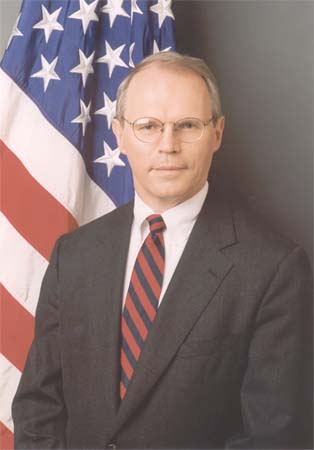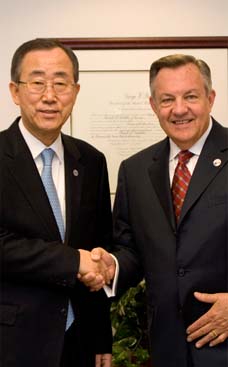
"Well, first of all, they want to be removed from the U.S. terrorism list. We have had a list of countries that sponsor terrorism. So there is a procedure for that. There is a procedure that the Executive Branch needs to follow. But most importantly, there's a procedure that the countries that are on the list need to follow in terms of providing assurances that they have not been supporting, supporters of terrorism, that they have signed on to UN covenants, to international agreements on terrorism, and they need to assure us that they won't be involved with that again. So there's an entire procedure which is pursuant to the U.S. legal regulations. I mean, it's important to understand that the terrorism list is a U.S. process designed to, as Secretary Rice has pointed out, designed to protect the U.S. from countries that have been state sponsors of terrorism. So we know the DPRK is interested in that. We've had some discussions with them. And we will proceed with this process and see how far we get." Christopher R. Hill, assistant secretary of state for East Asian and Pacific Affairs and former U.S. ambassador to South Korea, served as a Peace Corps Volunteer in Cameroon.
Christopher R. Hill Remarks Upon Arrival In Tokyo
Christopher R. Hill Remarks Upon Arrival In Tokyo
Saturday, 3 November 2007, 9:32 am
Press Release: US State Department
Christopher R. Hill
Assistant Secretary for East Asian and Pacific Affairs
Haneda Airport
Tokyo, Japan
November 3, 2007
Remarks Upon Arrival in Tokyo
QUESTION: (Inaudible)
ASSISTANT SECRETARY HILL: You'll recall that after I saw you, I got on an airplane, and we weren't able to talk. But maybe tonight we'll look to hear from him.
QUESTION: Who are you going to meet in Japan other than Sasae?
ASSISTANT SECRETARY HILL: Let me check with the Embassy, but I think with Sasae and his team in the Foreign Ministry. And I think tomorrow I'll meet some media at the Correspondents Club, I believe. And then I get on a plane and get back to Washington.
QUESTION: Have you made any requests to meet with somebody from the Prime Minister's Office?
ASSISTANT SECRETARY HILL: I think we do have a meeting with someone from the Prime Minister's Office, but I would ask you to check with the Embassy on that. I don't even know the schedule yet.
QUESTION: Is that Ms. Nakayama?
ASSISTANT SECRETARY HILL: Check with the Embassy. I shouldn't be speculating.
QUESTION: As for the session with the U.S. experts in Pyongyang currently, how reliable is the timeline to disarm the nuclear facilities in Yongbyon?
ASSISTANT SECRETARY HILL: Well, the disabling of these facilities is a process that is going to take several weeks, possibly even a month or two -- because part of the issue has to do with unloading the fuel from the reactor, which is a process that needs to be done safely. We have had two site survey teams, and then this is the first team that's actually going to accomplish the disabling. We anticipate that other members of the Six Parties will participate in subsequent missions. And so this was something that the North Koreans assured us is quite okay. So we expect other teams to come in.
QUESTION: After a meeting with North Koreans in Beijing, do you have any new developments, especially on the abduction issue, that you're going to tell Mr. Sasae?
ASSISTANT SECRETARY HILL: No, I don't have any new developments. Obviously, we talked about the abduction issue, and we talked about the course of the DPRK-Japanese working groups. And I will share that, of course, with Mr. Sasae. But I don't really have too much new information on that.
QUESTION: After the meeting with Beijing and South Korea, how does your counterpart feel about Pyongyang's demand in taking them off the list of the terror?
ASSISTANT SECRETARY HILL: I'm sorry--what is the question?
QUESTION: Pyongyang's demand in removing themselves off of the terror list.
ASSISTANT SECRETARY HILL: Well, first of all, they want to be removed from the U.S. terrorism list. We have had a list of countries that sponsor terrorism. So there is a procedure for that. There is a procedure that the Executive Branch needs to follow. But most importantly, there's a procedure that the countries that are on the list need to follow in terms of providing assurances that they have not been supporting, supporters of terrorism, that they have signed on to UN covenants, to international agreements on terrorism, and they need to assure us that they won't be involved with that again. So there's an entire procedure which is pursuant to the U.S. legal regulations. I mean, it's important to understand that the terrorism list is a U.S. process designed to, as Secretary Rice has pointed out, designed to protect the U.S. from countries that have been state sponsors of terrorism. So we know the DPRK is interested in that. We've had some discussions with them. And we will proceed with this process and see how far we get.
QUESTION: The timing of the ministerial--have you got a positive reply from the counterparts that you have already met after you met with the Chinese?
ASSISTANT SECRETARY HILL: I met with the South Koreans, who I think are very interested in participating as soon as it can be scheduled. I think everyone has been supportive of it, but my understanding from the Chinese is they do not yet have official word back on precisely which dates. Obviously, there's a desire to see if it can be done before the end of the year. But as we all know, the end of the year is always a busy time. So I think everyone wants to do it. Everyone sees it as valuable, especially as we should by the end of the year be coming to the end of this phase two and go into this very critical phase which involves the complete, irreversible elimination of nuclear weapons and nuclear programs in North Korea.
QUESTION: Are you going to have talks with Ambassador Schieffer?
ASSISTANT SECRETARY HILL: I always see Ambassador Schieffer when I arrive in Tokyo, so of course I will.
QUESTION: Are you going to discuss about his cable that he had sent to the President?
ASSISTANT SECRETARY HILL: I'm going to be talking with him on things I always talk about, which is what's been going on in the Six-Party process, what we're trying to do, and just briefing him -- just as I briefed Ambassador Vershbow in Seoul and also Ambassador Randt in Beijing.
QUESTION: So Ambassador Schieffer's intent is going to be reflected on your negotiations?
ASSISTANT SECRETARY HILL: I'm here mainly to brief the Japanese Government as part of -- Any time you visit a country, you brief your embassy, and that's what I was doing late last night with Ambassador Vershbow. And I'll be doing the same thing with Ambassador Schieffer.
QUESTION: In Beijing, there was some comment by Mr. Kim Gye-gwan about abduction issue?
ASSISTANT SECRETARY HILL: We discussed that issue, as I always do with the North Koreans, emphasizing our very strong view that we want to see substantial progress on that issue. It's an issue of great pain to the families of the abducted people. It's an issue of great pain, great concern to the Japanese people and, frankly, to our people as well. As I've always done, I raised the matter, and I stressed to the North Koreans that we want to see progress on this issue. How one defines progress, that has to be determined. But I think the most important thing is for the DPRK to be working diligently with the Japanese through the working-group process to try to address how this issue can be resolved and how the suffering of the families can be brought to an end.
QUESTION: What exactly are you talking to [inaudible], especially with the cable from Ambassador Schieffer?
ASSISTANT SECRETARY HILL: What I'm talking about is where we are in the Six-Party process. We had a team go into the DPRK yesterday. They brought a lot of equipment with them, and for the first time will be engaged directly in the process of disabling the reactor and the other facilities at Yongbyon. This is a process that is probably going to take right to the end of the year. We'd like this process to move seamlessly, if possible, into the process of dismantlement -- because what we're looking for is not just disablement, not just providing a declaration of programs, but rather moving to the end game, which is to ensure that we have a complete, irreversible dismantlement of all nuclear programs and nuclear weapons and abandonment of all those in North Korea.
It's going to be a very tough next phase. And if we're going to succeed in the next phase, we have to succeed in this phase, because we're in a step-by-step process. So believe me, we're working as hard as we can. It's very difficult. I have people who have been spending more time in North Korea than they have with their families back in Washington. So we have a lot of people who are working very hard [inaudible].
QUESTION: You said in Seoul that North Korea wants to be removed from the blacklist.
ASSISTANT SECRETARY HILL: It's called the list of state sponsors of terrorism. Yes.
QUESTION: You also said America want also.
ASSISTANT SECRETARY HILL: We want all countries that are on that list to be removed, but we want them to be removed by showing us that they are no longer engaged in the practice that put them on the list. That's the issue. The more countries on that list, the more problems we have. The fewer countries on that list -- provided when they come off, they come off because they can really show, demonstrably show, that they have stopped the behavior that put them on that list -- that would be better for all concerned.
QUESTION: Do you know if the expert team has been already arrived in --
ASSISTANT SECRETARY HILL: I don't know. I read in a news report that they actually were able to arrive there. So that's good news. And I'm sure they're working very hard, and I look forward to hearing from them. But why don't you let me get to the Embassy so I can maybe wait for a phone call from the team there?
OK? See you later.
Released on November 2, 2007













